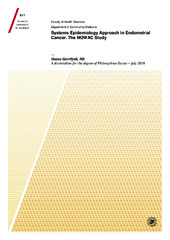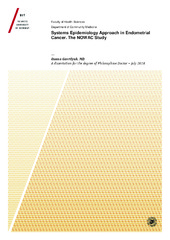| dc.contributor.advisor | Lund, Eiliv | |
| dc.contributor.author | Gavrilyuk, Oxana | |
| dc.date.accessioned | 2019-01-04T13:50:29Z | |
| dc.date.available | 2019-01-04T13:50:29Z | |
| dc.date.issued | 2018-12-12 | |
| dc.description.abstract | Endometrial cancer (EC) is one of the most common gynecologic cancers with extensively rising incidence worldwide. Norway is among the countries with the highest rates of EC. Although, most of the established risk factors for EC are well described, there are few studies from Norway investigating them in a cohort design. Moreover, modern clinical medicine, especially oncology, is moving towards personalized and individualized diagnostics and treatment approaches, and therefore there is a great need for studies focusing on detecting of biomarkers and changes in gene expression profiles long before the diagnosis takes place.
The main aim of this PhD project was to evaluate the risk factors that mostly contribute to the development of EC in Norwegian women, and to assess whether these risk factors have any influence on blood gene expression prior diagnosis.
The Norwegian Women and Cancer Study (NOWAC) is a prospective cohort study with approximately 172 000 female participants recruited from the entire Norway since 1991. The participants answered questionnaires regarding lifestyle, diet and health. Further a subset of approximately 50 000 women from NOWAC cohort were randomly recruited to NOWAC Postgenome Cohort and provided blood samples. For paper I, self-reported coffee consumption was evaluated in the light of possible protective effect against EC development in Norwegian population. In paper II, we studied the association between lifetime number of years of menstruation and EC. It was investigated whether this association is attenuated by other well-known modifiable lifestyle risk factors such as high BMI, diabetes, incomplete pregnancies and menopausal hormone therapy (MHT). In Paper III, using the systems epidemiology approach, we evaluated the impact of the major EC risk factors on prediagnostic blood gene expression signatures in a subcohort of 79 EC cases and 79 matching controls.
In line with previous reports, we demonstrated inverse association between coffee consumption and EC, which was especially pronounced in obese women and current smokers. However, in contrast to other studies this was observed only in heavy coffee drinkers (in our study those who drank ≥8 cups/day). In paper II we showed a statistically significant linear relationship between LNYM and EC risk, which remained significant after adjusting for BMI, diabetes, MHT and incomplete pregnancies. Paper III demonstrated that changes in parity status are associated with a number of alterations in immune gene sets in controls compared with EC cases, thus providing a novel view of pregnancy-associated EC protection.
In conclusion, the main findings of this work demonstrate the complexity of endometrial carcinogenesis and emphasize necessity of further investigations on both reproductive and lifestyle risk factors combined with translational research approaches. The results showing gene expression changes connected to long-term protective effect of parity might serve a solid foundation for further investigations on specific pregnancy-related mechanisms preventing EC development. | en_US |
| dc.description.doctoraltype | ph.d. | en_US |
| dc.description.popularabstract | Endometrial cancer (EC) is one of the most common gynecologic cancers with extensively rising incidence worldwide. Norway is among the countries with the highest rates of EC. Although, most of the established risk factors for EC are well described, there are few studies from Norway investigating them in a cohort design. Moreover, modern clinical medicine, especially oncology, is moving towards personalized and individualized diagnostics and treatment approaches, and therefore there is a great need for studies focusing on detecting of biomarkers and changes in gene expression profiles long before the diagnosis takes place.
The main aim of this PhD project was to evaluate the risk factors that mostly contribute to the development of EC in Norwegian women, and to assess whether these risk factors have any influence on blood gene expression prior diagnosis.
The Norwegian Women and Cancer Study (NOWAC) is a prospective cohort study with approximately 172 000 female participants recruited from the entire Norway since 1991. The participants answered questionnaires regarding lifestyle, diet and health. Further a subset of approximately 50 000 women from NOWAC cohort were randomly recruited to NOWAC Postgenome Cohort and provided blood samples. For paper I, self-reported coffee consumption was evaluated in the light of possible protective effect against EC development in Norwegian population. In paper II, we studied the association between lifetime number of years of menstruation and EC. It was investigated whether this association is attenuated by other well-known modifiable lifestyle risk factors such as high BMI, diabetes, incomplete pregnancies and menopausal hormone therapy (MHT). In Paper III, using the systems epidemiology approach, we evaluated the impact of the major EC risk factors on prediagnostic blood gene expression signatures in a subcohort of 79 EC cases and 79 matching controls.
In line with previous reports, we demonstrated inverse association between coffee consumption and EC, which was especially pronounced in obese women and current smokers. However, in contrast to other studies this was observed only in heavy coffee drinkers (in our study those who drank ≥8 cups/day). In paper II we showed a statistically significant linear relationship between LNYM and EC risk, which remained significant after adjusting for BMI, diabetes, MHT and incomplete pregnancies. Paper III demonstrated that changes in parity status are associated with a number of alterations in immune gene sets in controls compared with EC cases, thus providing a novel view of pregnancy-associated EC protection.
In conclusion, the main findings of this work demonstrate the complexity of endometrial carcinogenesis and emphasize necessity of further investigations on both reproductive and lifestyle risk factors combined with translational research approaches. The results showing gene expression changes connected to long-term protective effect of parity might serve a solid foundation for further investigations on specific pregnancy-related mechanisms preventing EC development. | en_US |
| dc.description.sponsorship | Helse Nord RHF | en_US |
| dc.identifier.uri | https://hdl.handle.net/10037/14380 | |
| dc.language.iso | eng | en_US |
| dc.publisher | UiT The Arctic University of Norway | en_US |
| dc.publisher | UiT Norges arktiske universitet | en_US |
| dc.relation.haspart | <p>Paper I: Gavrilyuk, O., Braaten, T., Skeie, G., Weiderpass, E., Dumeaux, V. & Lund, E. (2014). High coffee consumption and different brewing methods in relation to postmenopausal endometrial cancer risk in the Norwegian women and cancer study: a population-based prospective study. <i>BMC Womens Health, 14</i>:48. Also available at <a href=http://hdl.handle.net/10037/7267>http://hdl.handle.net/10037/7267. </a> <p>
<p>Paper II: Gavrilyuk, O., Braaten, T., Weiderpass, E, Licaj, I. & Lund, E. (2018). Lifetime number of years of menstruation as a risk index for postmenopausal endometrial cancer in the Norwegian Women and Cancer Study. (Accepted manuscript). Final version in <i>Acta Obstetricia et Gynecologica Scandinavia, 97</i>(10), 1168-1177, available at <a href=https://doi.org/10.1111/aogs.13381>https://doi.org/10.1111/aogs.13381. </a><p>
<p>Paper III: Gavrilyuk, O., Snapkov, I., Thalabard, J.C., Holden, L., Holden, M., Bøvelstad, H.M. … Lund, E. Gene expression profiling of peripheral blood and endometrial cancer risk factors: systems epidemiology approach in the NOWAC Postgenome Cohort Study. (Manuscript).<p> | en_US |
| dc.relation.ispartofseries | ISM skriftserie; 198 | |
| dc.rights.accessRights | openAccess | en_US |
| dc.rights.holder | Copyright 2018 The Author(s) | |
| dc.subject.courseID | DOKTOR-003 | |
| dc.subject | VDP::Medical disciplines: 700::Health sciences: 800::Epidemiology medical and dental statistics: 803 | en_US |
| dc.subject | VDP::Medisinske Fag: 700::Helsefag: 800::Epidemiologi medisinsk og odontologisk statistikk: 803 | en_US |
| dc.subject | VDP::Medical disciplines: 700::Clinical medical disciplines: 750::Gynecology and obstetrics: 756 | en_US |
| dc.subject | VDP::Medisinske Fag: 700::Klinisk medisinske fag: 750::Gynekologi og obstetrikk: 756 | en_US |
| dc.title | Systems Epidemiology Approach in Endometrial Cancer. The NOWAC Study | en_US |
| dc.type | Doctoral thesis | en_US |
| dc.type | Doktorgradsavhandling | en_US |


 English
English norsk
norsk
